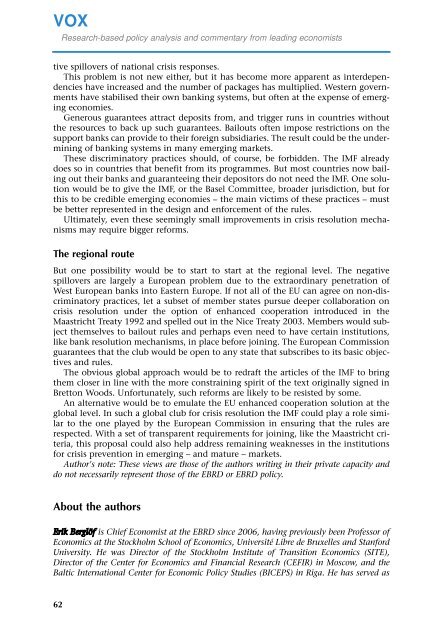What G20 Leaders Must Do To Stabilise our Economy and Fix ... - Vox
What G20 Leaders Must Do To Stabilise our Economy and Fix ... - Vox
What G20 Leaders Must Do To Stabilise our Economy and Fix ... - Vox
Create successful ePaper yourself
Turn your PDF publications into a flip-book with our unique Google optimized e-Paper software.
VOXResearch-based policy analysis <strong>and</strong> commentary from leading economiststive spillovers of national crisis responses.This problem is not new either, but it has become more apparent as interdependencieshave increased <strong>and</strong> the number of packages has multiplied. Western governmentshave stabilised their own banking systems, but often at the expense of emergingeconomies.Generous guarantees attract deposits from, <strong>and</strong> trigger runs in countries withoutthe res<strong>our</strong>ces to back up such guarantees. Bailouts often impose restrictions on thesupport banks can provide to their foreign subsidiaries. The result could be the underminingof banking systems in many emerging markets.These discriminatory practices should, of c<strong>our</strong>se, be forbidden. The IMF alreadydoes so in countries that benefit from its programmes. But most countries now bailingout their banks <strong>and</strong> guaranteeing their depositors do not need the IMF. One solutionwould be to give the IMF, or the Basel Committee, broader jurisdiction, but forthis to be credible emerging economies – the main victims of these practices – mustbe better represented in the design <strong>and</strong> enforcement of the rules.Ultimately, even these seemingly small improvements in crisis resolution mechanismsmay require bigger reforms.The regional routeBut one possibility would be to start to start at the regional level. The negativespillovers are largely a European problem due to the extraordinary penetration ofWest European banks into Eastern Europe. If not all of the EU can agree on non-discriminatorypractices, let a subset of member states pursue deeper collaboration oncrisis resolution under the option of enhanced cooperation introduced in theMaastricht Treaty 1992 <strong>and</strong> spelled out in the Nice Treaty 2003. Members would subjectthemselves to bailout rules <strong>and</strong> perhaps even need to have certain institutions,like bank resolution mechanisms, in place before joining. The European Commissionguarantees that the club would be open to any state that subscribes to its basic objectives<strong>and</strong> rules.The obvious global approach would be to redraft the articles of the IMF to bringthem closer in line with the more constraining spirit of the text originally signed inBretton Woods. Unfortunately, such reforms are likely to be resisted by some.An alternative would be to emulate the EU enhanced cooperation solution at theglobal level. In such a global club for crisis resolution the IMF could play a role similarto the one played by the European Commission in ensuring that the rules arerespected. With a set of transparent requirements for joining, like the Maastricht criteria,this proposal could also help address remaining weaknesses in the institutionsfor crisis prevention in emerging – <strong>and</strong> mature – markets.Author's note: These views are those of the authors writing in their private capacity <strong>and</strong>do not necessarily represent those of the EBRD or EBRD policy.About the authorsErik Berglöf is Chief Economist at the EBRD since 2006, having previously been Professor ofEconomics at the Stockholm School of Economics, Université Libre de Bruxelles <strong>and</strong> StanfordUniversity. He was Director of the Stockholm Institute of Transition Economics (SITE),Director of the Center for Economics <strong>and</strong> Financial Research (CEFIR) in Moscow, <strong>and</strong> theBaltic International Center for Economic Policy Studies (BICEPS) in Riga. He has served as62














